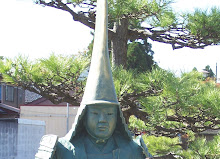Of course the answer is yes, but statistics show that only around 1% of the Japanese are Christian. And while no one thinks of Japan and Japanese culture as even remotely Christian, there is a substantial Christian presence in Japanese history.
It's been observed that there really is no Japanese religion to speak of right now. If you're in a cynical mood you might even suggest that materialism is the Japanese religion of choice, but certainly there is much more to the Japanese spirit.
To speak of Japanese religions that have impacted Japanese culture, you would have to note the native Shinto religion, Japanese Zen Buddhism (Chan Buddhism in China), ancestor worship, the Confucian ethical code and Christianity.
It's interesting to note that Japanese Prime Minister Aso is Catholic, which makes him a minority of a minority in Japanese culture, for Catholics in Japan are only a small sliver of the Christian population. Most Japanese Christians represent various Protestant denominations. And while there was almost nothing said about his being a Catholic in the Japanese media, it was noted in many American media outlets that he was the "first Catholic Prime Minister in Japanese history."
Christians in Japanese history go back to the Japanese arrival of Catholic priest St. Francis Xavier in 1549. He seems to have had a fair amount of success preaching about Jesus Christ and making converts. St. Xavier paved the way for a Japanese Catholic saint named St. Paul Miki, who met his death when political actors in Japan started worrying about the loyalty of Japanese Catholic people. From Catholic online:
"(St. Paul Miki) was crucified on February 5 with twenty-five other Catholics during the persecution of Christians under the Taiko, Toyotomi Hideyoshi, ruler of Japan in the name of the emperor."
Despite many persecutions, the disciples of St. Xavier and St. Paul Miki, continued in their practice of the Catholic faith - even without priests - most notably in and around Hiroshima.
There is an excellent blog on what Japanese Catholic people are doing today, written by a "twenty-something ex-pat", who uncovers fascinating items about Japanese worship and Catholics practicing their faith in Japan.
Yet the question remains, why has Christianity failed to find fertile soil in Japanese culture?
I think part of the issue is that the Japanese see Christianity as a foreign religion. And though Christianity began in the Middle East and is today vibrant in Asia - most intensely in the Philippines, South Korea and now China - it's still seen by Japanese people as a European religion.
I think the main development to watch regarding Japan and Christianity is China and its experience with Christianity.
Right now Christianity is spreading rapidly in China, and is the spiritual force behind Chinese efforts to oppose the Communist government's human rights abuses. Much of Japanese history and Japanese tradition has been influenced by Chinese religion, art and philosophy....So stay tuned.








No comments:
Post a Comment